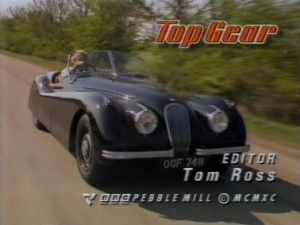Top Gear (1977 TV series)/Series 23/Episode 3
| Episode 3 | |||
|---|---|---|---|
 A Jaguar XK120. A Jaguar XK120. | |||
| Prod. code | NBMN308N | ||
| No. | 201 | ||
| Runtime | 29:19 | ||
| Airdate | 10th April, 1990 | ||
| Episode Chronology |
| ||
-->
Series 23, Episode 3 of Top Gear aired on the 10th April, 1990. It was the third episode of Series 23; the 201st episode of Top Gear overall, including compilations. It was the 192nd episode since Top Gear entered national broadcasting in 1978, and was the 3rd programme to air in 1990 out of a total 18. Series 23, Episode 3 was originally broadcast in 576i at a 4:3 Standard aspect ratio on British television channel BBC Two. The episode was presented by William Woollard and Tiff Needell, with no other hosts presenting a piece to camera that week.
Synopsis
As narrated by William Woollard:
- A new family-sized hatchback from Yugoslavia.
- Last week solar power; this week other alternatives to petrol.
- And motor racing, with the mighty Austin 7.
This week, William Woollard is stood outside Jaguar's Browns Lane plant in Coventry, along with an E-Type. Five months earlier, the sports and luxury car maker had been sold to Ford for £1.6 billion[1] from its former owners British Leyland. To commemorate this landmark purchase, the episode will focus on the history that Ford has chosen to buy into, going over some of Jaguar's greatest hits.
Early Days
Jaguar was founded by William Lyons as the Swallow Sidecar[2][3] company, or SS for short. Their first car entered production in 1931 on the running gear from a saloon originally produced by Standard, including the engine, which at just 53[4] brake horsepower, did not have enough power to Lyons' liking. To remedy this, Lyons appointed Bill Heynes[5] in order to strip down and re-engineer the Standard engines to produce more power. While developing subsequent models such as the SS100, Heynes had the inspired idea of naming his cars after the Jaguar species of panther, as naming cars after animals was allegedly[6] a popular practice at the time. The car was also capable of 100 MPH due to its light weight and high power-to-weight ratio, and thus the image of Jaguar was born, the company changing its name after the Second World War to avoid obvious Nazi connotations.
The XK120
What was Jaguar's big break however came in 1948 with the XK120, a car originally intended[7] as a concept for the 1948 motor show held at Earl's Court. However, demand was so great from both sides of the Atlantic that it had to be put into full-scale production. Lyons' swooping, striking exterior design coupled with Heynes' engineering prowess, such as the innovation of a double-overhead camshaft utilised in considerably more expensive, exotic sports cars, helped propel the XK120 to a great deal of success, including holding[8] the record as the world's fastest production car. Quickly, the company was beginning to earn a reputation, and this would prompt the company to enter the world of motorsport.
References
- ↑ New York Times - Ford to Buy Jaguar For $2.38 Billion.
- ↑ Britain By Car - Swallow Sidecar Company.
- ↑ However, some sources seem to disagree, including a brochure shown in the episode, which infers "SS" instead stood for Standard Swallow.
- ↑ Ultimatecarpage - SS 1 1932-1936.
- ↑ Jaguar Daimler Heritage Trust - William Lyons.
- ↑ Smiths Instruments - Jaguar Cars Legacy Starts with SS Jaguar 100
- ↑ Jaguar Enthusiasts' Club - XK120.
- ↑ Sports Car Digest - Jaguar XK120.
| ||||||||
- Episodes
- Episodes of Top Gear
- Episodes of Top Gear (1977 TV series)
- Third Episodes
- Third Episodes of Top Gear
- Third Episodes of Top Gear (1977 TV series)
- Episodes which aired on 10th April
- Episodes of Top Gear which aired on 10th April
- Episodes of Top Gear (1977 TV series) which aired on 10th April
- Episodes which aired in 1990
- Episodes broadcast in 576i
- Episodes of Top Gear broadcast in 576i
- Episodes broadcast at 4:3 Standard aspect ratio
- Episodes of Top Gear broadcast at 4:3 Standard aspect ratio
- Episodes broadcast on BBC Two
- Episodes of Top Gear broadcast on BBC Two
- Episodes presented by William Woollard
- Episodes of Top Gear presented by William Woollard
- Episodes presented by Tiff Needell
- Episodes of Top Gear presented by Tiff Needell
- Episodes of Top Gear with an introduction narrated by William Woollard